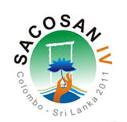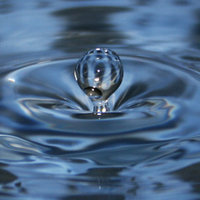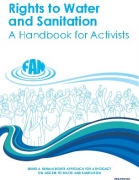World
Call for entries for the 2012 Nestlé Prize in Creating Shared Value - Submit your entry from 11th February to 30th June 2011
Posted on 14 Mar, 2011 05:38 PM![]() The Nestlé Prize in Creating Shared Value is awarded in alternate years to an individual, a non-government organisation (NGO) or a small business to reward an outstanding innovation or project in the area of:
The Nestlé Prize in Creating Shared Value is awarded in alternate years to an individual, a non-government organisation (NGO) or a small business to reward an outstanding innovation or project in the area of:
- Improving access to and management of water
- Delivering high nutritional value to populations suffering from nutritional deficits
- Improving the lives of farmers and rural communities
IV South Asian Conference on Sanitation (SACOSAN IV) by Ministry of Water Supply & Drainage , 4th - 8th April, 2011, Colombo, Sri Lanka
Posted on 01 Mar, 2011 03:01 PM Sanitation enhances quality of life.
Sanitation enhances quality of life.
Organizer: Ministry of Water Supply & Drainage, Sri Lanka
Venue: Bandaranaike Memorial International Conference Hall (BMICH), Bauddhaloka Mawatha, Colombo, Sri Lanka
Topics:
- Reaching the “un-served”
- Hygiene for adding value to & promotion of Sanitation
Water consumption by forests - Chetan Pandit
Posted on 28 Feb, 2011 09:49 AMToday is 22 February, 10 days afterwards, and there is not a single reply to it.
Map your events on World Water Day 2011
Posted on 24 Feb, 2011 03:03 PM
This year's theme, Water for cities: Responding to the urban challenge, aims to spotlight and encourage governments, organizations, communities, and individuals to actively engage in addressing the defy of urban water management.
Introduction to Integrated Water Resource Management (IWRM) - Open courseware from the United Nations University (UNU)
Posted on 19 Feb, 2011 11:13 PM This introductory course on Integrated Water Resource Management (IWRM), from the United Nations University (UNU), provides a brief historical background and overview of IWRM and gives an overview of the various aspects of IWRM, from integration, capacity building to applications and case studies.
This introductory course on Integrated Water Resource Management (IWRM), from the United Nations University (UNU), provides a brief historical background and overview of IWRM and gives an overview of the various aspects of IWRM, from integration, capacity building to applications and case studies.
IWRM has been defined by the Global Water Partnership (2000) as a process, which promotes the coordinated development and management of water, land and related resources in order to maximize the resultant economic and social welfare in an equitable manner without compromising the sustainability of vital ecosystems. An important aspect of any IWRM program is therefore, research, planning and action at the river basin level.
Indian Summer Program Inspiring Reflective Exploration(InSPIRE), 6th July - 12th August, 2011
Posted on 16 Feb, 2011 12:54 PMInSPIRE is a 5-week long summer immersion program in India that aims to facilitate the process of both internal and external exploration for young Indians/South Asians drawn to the land of their heritage.
The short duration and middle-of-summer dates allow participants from quarter, semester and trimester system universities the flexibility to schedule other activities before or after the program, such as volunteering with an Indian NGO, visiting relatives in India or getting a job.
Sethusamudram channel project - An epoch making event - Paper presented at the National Seminar on Water and Culture (2007)
Posted on 14 Feb, 2011 05:24 AMBeginning with the need for a such a shipping lane, the author compares its importance to the Suez and Panama canal. Currently ships have to go round Sri Lanka to go between the two India coasts. This increases the passage time and fuel costs.The canal would lead to a saving of 254 to 424 nautical miles and reduce sailing time of ships by 21 to 36 hours.
International ReSource Award for Sustainable Watershed Management 2012 - Swiss Re - Deadline 30 April 2011
Posted on 08 Feb, 2011 03:31 PMThe International ReSource Award is worth USD 150 000 in total and is granted to one or several projects selected by an international jury. Launched in 2002, the ReSource award is an internationally recognised prize for leadership in implementing the principles of sustainability in watershed management. It is conferred annually. The prize money is awarded exclusively for project implementation activities and not for building-up or strengthening the organizations that are submitting an application.
Eligibility to participate:
NGOs, private, scientific or public institutions and similar bodies are invited to participate in the tender for the International ReSource award for Sustainable Watershed Management. Projects comprising more than one institution (eg public-private
Questions on the ‘Value’ of a river for Indians - A review of the book "Economics of River Flows" by Dr. Bharat Jhunjhunwala
Posted on 01 Feb, 2011 05:38 PMIn his last book, 'Economics of hydropower' Dr. jhunjhunwala comes to a conclusion that we have neglected some very important costs of hydropower, while overestimating its benefit.
Right to water and sanitation - A handbook for activists by Freshwater Action Network (FAN) Global
Posted on 31 Jan, 2011 10:11 PM With tihs, they can improve water and sanitation service regulation and provision at international, national and local levels. Directed primarily at community groups, human rights NGOs, rights-based development practitioners and aid workers, this handbook aims to strengthen human rights-based advocacy by providing innovative and practical suggestions that activists and organisations can use in their work. It also acts as a resource guide for finding further information.
With tihs, they can improve water and sanitation service regulation and provision at international, national and local levels. Directed primarily at community groups, human rights NGOs, rights-based development practitioners and aid workers, this handbook aims to strengthen human rights-based advocacy by providing innovative and practical suggestions that activists and organisations can use in their work. It also acts as a resource guide for finding further information.
Water and sanitation are essential for living a healthy life with dignity. However, around a billion people across the world lack access to a safe and sufficient water supply to cover their basic needs. Over 2.5 billion people lack access to adequate sanitation and nearly 1.2 billion face the indignity of open defecation every day.
The Millennium Development Goal (MDG) target to halve the proportion of people without sustainable access to safe drinking water and basic sanitation by 2015 is seriously off track, with sanitation severely lagging behind. For example, estimates suggest that at current rates of progress, sub-Saharan Africa will miss the MDG water target by about 25 years, while the sanitation target may not be reached until well into the 22nd century.